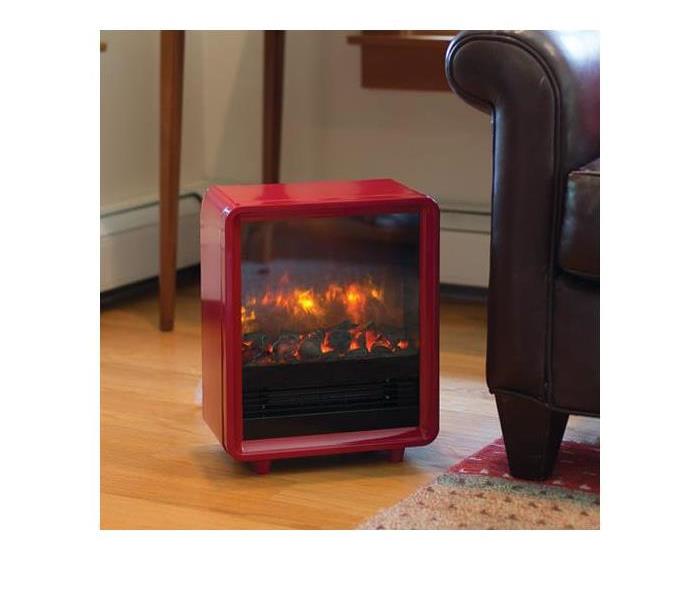Recent General Posts
Lake & Boating Safety
7/1/2021 (Permalink)
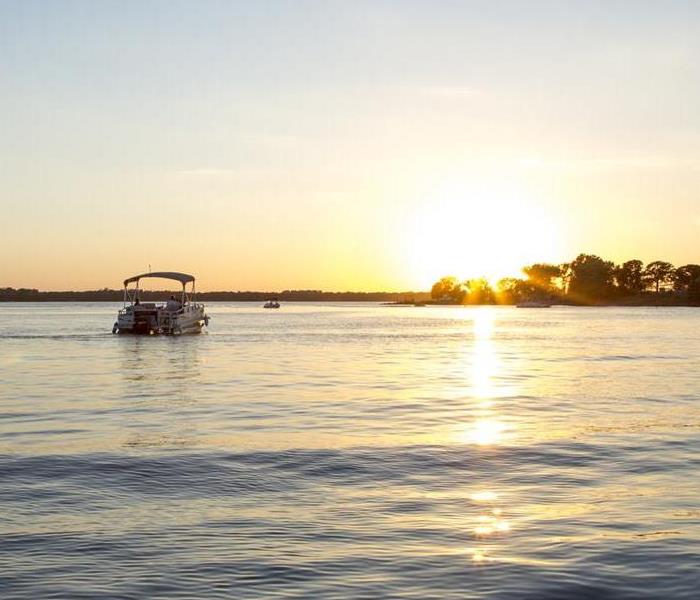 Boat on Grand Lake near Langley, Oklahoma
Boat on Grand Lake near Langley, Oklahoma
As a locally owned SERVPRO® Franchise, SERVPRO® of Mayes and Wagoner Counties is the leading storm damage restoration company serving the Coweta, Wagoner, Porter, Broken Arrow, Pryor, Chouteau, Locust Grove, Adair, Langley, Salina, Disney, Spavinaw, Okay, East Tulsa and Grand Lake areas with continuous coverage 24-hours a day, seven days a week. When severe weather damages a home or business, SERVPRO® technicians are ready to respond to any disaster and make it “Like it never even happened."
Summer is synonymous with barbecues, swimming, and fireworks. Today we will cover Lake and Water safety.
Oklahoma is home to over 200 lakes and over 1 million surface acres, perfect for boating, swimming, fishing and all kinds of water recreation. In our area we have five lakes, Grand Lake, Hudson Lake, Fort Gibson Lake, Spavinaw Lake and Lake Eucha.
And if you’ve been in Oklahoma for any amount of time, you know that this time of the year is lake time. But with that fun time in the water comes some safety tips that everyone should review.
When Swimming
- Never swim alone.
- Always wear a Coast Guard approved life vest. The USCG estimates that 76% of fatal accidents were the result of not wearing a life vest.
- Make sure your life vest fits you properly.
- Swim in designated areas.
- Always supervise children.
- Avoid using alcohol and drugs that can impair your motor skills.
- Understand the lake currents where you’re at.
- Know the weather conditions.
- Do not dive into the water. Jumping from cliffs or bridges is dangerous due to shallow water, submerged rocks, trees, or other hazards.
- Learn cardiopulmonary resuscitation (CPR). Because of the time it might take for emergency services to arrive, your CPR skills can make a difference in saving someone's life.
- Know the local weather conditions and forecast before swimming or boating. Strong winds and thunderstorms with lightning strikes are dangerous to swimmers and boaters.
- Do not use air-filled or foam toys, such as water wings, noodles, or inner tubes, in place of life jackets. These are toys and are not designed to keep swimmers safe.
When Boating
- Know the lake. Find a map of the lake you will be on and look out for dangerous spots, such as underwater structures, low water areas, areas prone to debris.
- Understand signage and flags around the lake and docks.
- Know the rules. Know the boating regulations for the area and state you are in.
- Have your boat checked by a professional. It is good to have your boat checked over by a professional at least once per boating season.
- Do a check of your boat before every time you go out. Check your motors, check the exterior of the boat. Doing a general check each time will help eliminate problems once out on the water.
- Use common sense. One of the most important parts of boating safety is to use your common sense.
- Always operate your vessel at a safe speed,
- Always stay alert not only of what is going on inside your boat but what is happening outside of it, this includes other watercraft, people, objects, etc.
- Be aware of buoys and other navigational aids, all of which have been placed there to ensure your own safety.
Other Helpful Tips
- Stay hydrated. Drink plenty of water and fluids while out on the lake to avoid heat stroke. Your body can dehydrate faster than you realize.
- Pack sunscreen. Apply sunscreen often throughout the day to avoid serious sunburn.
- Be aware of Carbon Monoxide poisoning while boating, especially if you are with a group of boats close together.
- Keep your phone, keys, and wallet in a sealed plastic bag to keep them water safe.
For more water safety information, visit www.redcross.org
For a lake near you, visit, www.travelok.com
SERVPRO® of Mayes and Wagoner Counties specializes in Fire and Water Cleanup and Restoration.
If you have any questions, call SERVPRO® of Mayes and Wagoner Counites, 918-486-1055 or email us at office@SERVPRO10980.com .
24/7 Emergency Response. Always FREE Estimates for any job.
SERVPRO® has an A+ rating with the Better Business Bureau.
Why SERVPRO®
5/4/2021 (Permalink)
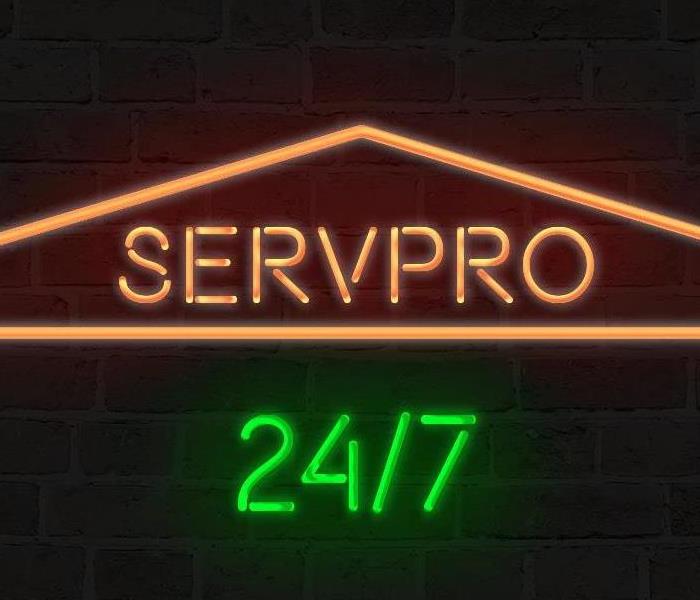 SERVPRO® is open 24/7
SERVPRO® is open 24/7
Why SERVPRO®?
SERPVRO® has been in business since 1967, has over 1,700 franchises all over the United States, 24-Hour Emergency service, detailed estimates and has trained technicians to meet every disaster need.
SERVPRO® specializes in Fire & Water – Cleanup @ Restoration.
SERVPRO® works with all residential, business, and commercial losses.
SERVPRO® offers a wide variety of professional services, from cleaning to restoration!
Cleaning
- Carpet, Upholstery, Drapes and Blinds.
- Ceilings, Walls and Hard Floors
- Air Ducts and HVAC
- Deodorization
- Biohazard and Crime Scene
- Vandalism
Restoration
- Fire, Smoke and Soot
- Water Removal and Dehumidification
- Mold, Mitigation and Remediation
- Catastrophic Storm Response
- Move Outs and Contents Restoration
- Electronics and Equipment
- Document Drying
- Contents Claim Inventory Services
Reconstruction
- We have in house crews to take care of your reconstruction needs.
- We can act as your general contractor to get you back in business.
- We have a list of preferred vendors to use for every project.
SERVPRO® proves to be faster to the disaster with our Timely Assignment guarantee.
- Within one hour from notice of loss, a SERVPRO® Franchise professional will contact you to arrange for service.
- Within four hours of loss notification, a SERVPRO® Franchise Professional will be on site to start mitigation services.
- Within eight hours of on-site arrival, a verbal briefing of the scope will be communicated to the adjuster. Which means, with approval work will begin ASAP.
There are no more waiting days for a contractor to respond when every hour counts, SERVPRO® is Here to Help.
What about Insurance?
SERVPRO® is the preferred Cleanup & Restoration company for most major insurance company and works with all insurance companies. We work with your insurance company directly to expedite your claim to get you back into your home or business as quick as possible. Our technicians will give detailed estimates, generate comprehensive room-by-room inventories, and categorize what can be salvaged and what is non-salvage from your loss.
If necessary, our SERVPRO® professionals are trained to move out and store inventory properly for the cleaning and reconstruction process.
Our Technicians are Certified!
Our technicians boast IICRC Certifications and go through continuing education classes to stay up to date on the latest tools, technology, and techniques.
- Water Damage Restoration Technician (WRT)
- Carpet Cleaning Technicians (CCT)
- Fire and Smoke Damage Restoration Technicians (FSRT)
- Upholstery and Fabric Cleaning Technicians (UFT)
- Applied Structural Drying Technicians (ASD)
Advanced Technology!
SERVPRO® understands using the proper equipment makes a measurable difference in reducing claim loss expenses. Using the right tool for the job, combined with our trained technicians saves the homeowner time and money.
From Detection equipment, Extraction equipment, Air Moving equipment, Dehumidification equipment and Deodorization equipment SERVPRO® has it all to ensure the right tool for the job.
If you have any questions, call your SERVPRO® of Mayes and Wagoner Counites, 918-486-1055. 24/7 Emergency Response. Always FREE Estimates for any job.
SERVPRO® of Mayes and Wagoner Counties specializes in Fire and Water Cleanup and Restoration.
SERVPRO® has an A+ rating with the Better Business Bureau.
Summer Hygiene Tips
5/4/2021 (Permalink)
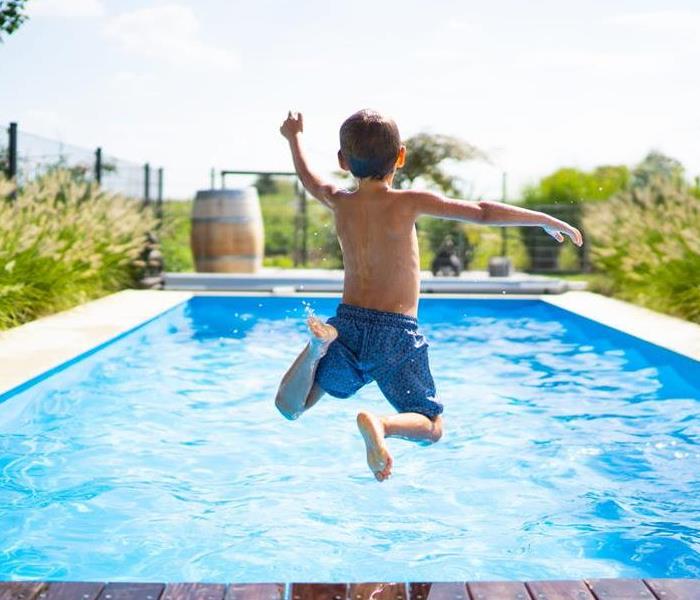 Summer time means pool time
Summer time means pool time
With restrictions being lifted or lightened and summer right around the corner, here are some summer hygiene tips to help you and your family whether you are going to the local pool (Pryor, Wagoner, Coweta) or water park (Wagoner) or the many lakes in our area such as Hudson Lake, Fort Gibson Lake, Grand Lake, Spavinaw Lake or Lake Eucha.
Healthy Swimming Behaviors
Although chlorine and other disinfectants are an effective way to kill germs found in recreational water, they do not work instantly. Despite the use of disinfectants, many people have become sick with recreational water illnesses (RWIs), which are caused by germs spread by swallowing, breathing in mists or aerosols of, or having contact with contaminated water from swimming pools, hot tubs/spas, lakes, rivers, or oceans.
RWIs include gastrointestinal, skin, ear, respiratory, eye, neurologic, and wound infections. The most commonly reported RWI is diarrhea, caused by germs like Cryptosporidium (“Crypto”) and E. coli 0157:H7.
In the past two decades, there has been an increase in the number of RWI outbreaks. Remember, chlorine and other disinfectants do not kill germs instantly. Additionally, the mixing of chlorine with pee and sweat uses up the chlorine in the pool, which would otherwise kill germs.
We all share the water we swim in, and each of us needs to do our part to help keep ourselves, our families, and our friends healthy.
To help protect yourself and other swimmers from germs, here are a few easy and effective steps all swimmers can take each time we swim:
Keep the pee, poop, sweat, and dirt out of the water!
- Stay out of the water if you have diarrhea.
- Shower before you get in the water.
- Don’t pee or poop in the water.
- Don’t swallow the water.
Every hour—everyone out!
- Take kids on bathroom breaks.
- Check diapers and change them in a bathroom or diaper-changing area–not poolside–to keep germs away from the pool.
- Reapply sunscreen.
- Drink plenty of fluids.
Check the free chlorine level and pH before getting into the water.
- Pools: Proper free chlorine level (1–3 mg/L or parts per million [ppm]) and pH (7.2–7.8) maximize germ-killing power.
- Hot tubs/spas: Proper disinfectant level (chlorine [3–10 parts per million or ppm] or bromine [4–8 ppm] and pH [7.2–7.8]) maximize germ-killing power.
- Most superstores, hardware stores, and pool-supply stores sell pool test strips.
For more safety tips or information, visit https://www.cdc.gov/healthywater/hygiene/swimming/index.html
If you have any questions, call your SERVPRO® of Mayes and Wagoner Counites, 918-486-1055. 24/7 Emergency Response. Always FREE Estimates for any job.
SERVPRO® of Mayes and Wagoner Counties specializes in Fire and Water Cleanup and Restoration.
SERVPRO® has an A+ rating with the Better Business Bureau.
Tips to keep your Pets safe during Freezing Temps
2/18/2021 (Permalink)
 Keeping your pets Warm in freezing temps
Keeping your pets Warm in freezing temps
In many areas, winter is a season of bitter cold and numbing wetness. Make sure your four-footed family members stay safe and warm by following these simple guidelines.
- Keep pets sheltered - Keep your pets inside with you and your family if possible.
- If your dog (or cat) is outdoors much of the day, they must be protected by a dry, draft-free shelter that is large enough to allow them to move comfortably, but small enough to hold in body heat. The floor should be raised a few inches from the ground and covered with cedar shavings or straw. The doorway should be covered with waterproof burlap or heavy plastic.
- Pets who spend a lot of time outdoors need more food in the winter because keeping warm depletes energy. Make sure that they have adequate food.
- Routinely check your pet's water dish to make certain the water is fresh and unfrozen. Use plastic food and water bowls; when the temperature is low, your pet's tongue can stick and freeze to metal.
- Bundle up, wipe down - Exposed skin on noses, ears and paw pads are at risk for frostbite and hypothermia during extreme cold snaps. Look into getting your pet a coat or sweater, especially for short hair breeds.
- Rock salt and other chemicals used to melt snow and ice can irritate the pads of your pet's feet. Wipe all paws with a damp towel before your pet licks them and irritates their mouth.
- Dogs are at particular risk of salt poisoning in winter due to the rock salt used in many areas—often when licking it from their paws after a walk. Store de-icing salt in a safe place and wipe your dog’s paws, even after short walks. If your dog ingests rock salt, call a veterinarian immediately.
- Remove common poisons - Antifreeze is a deadly poison, but it has a sweet taste that may attract animals and children. Wipe up any antifreeze spills immediately and keep it, like all household chemicals, out of reach. Coolants and antifreeze made with propylene glycol are less toxic to pets, wildlife and family.
- Protect outdoor animals - If there are outdoor cats, either owned pets or community cats in your area, remember that they need protection from the elements as well as food and water.
- You can make your own cat shelter quickly and easily with a plastic tub.
- Cars are one of many hazards to small animals—warm engines in parked cars attract cats and small wildlife, who may crawl up under the hood. To avoid injuring any hidden animals, bang on your car's hood to scare them away before starting your engine.
- Speak out - If you encounter a pet left in the cold, politely let the owner know you're concerned. Some people genuinely do not know the risk that cold weather poses to their pets or livestock and will be quick to correct any problems you address. If someone you raise these concerns with responds poorly or continues to neglect their animals, follow our steps on reporting winter neglect.
Horse and Livestock Care - Be sure your livestock has access to a barn or a three-sided run-in so they can escape the wind and cold. While not all horses will need to be blanketed, blankets will help horses keep warm and dry, especially if there is any rain or snow. If you’ve body-clipped your horses, keep them blanketed throughout the winter.
Always give your livestock access to unfrozen water. You can use heated buckets or water heaters/de-icers to make sure the water doesn’t freeze.
For more information on how to keep your pets safe, visit https://www.humanesociety.org/resources/five-ways-protect-pets-winter
For more Tips and Tricks, check out more of our blogs at https://www.SERVPROmayesandwagonercounties.com/blog
SERVPRO® of Mayes and Wagoner Counties specializes in Fire and Water Cleanup and Restoration.
If you have any questions, call your SERVPRO® of Mayes and Wagoner Counites, 918-486-1055. 24/7 Emergency Response Always FREE Estimates for any job.
COVID-19 Tips and Protecting Yourself
1/11/2021 (Permalink)
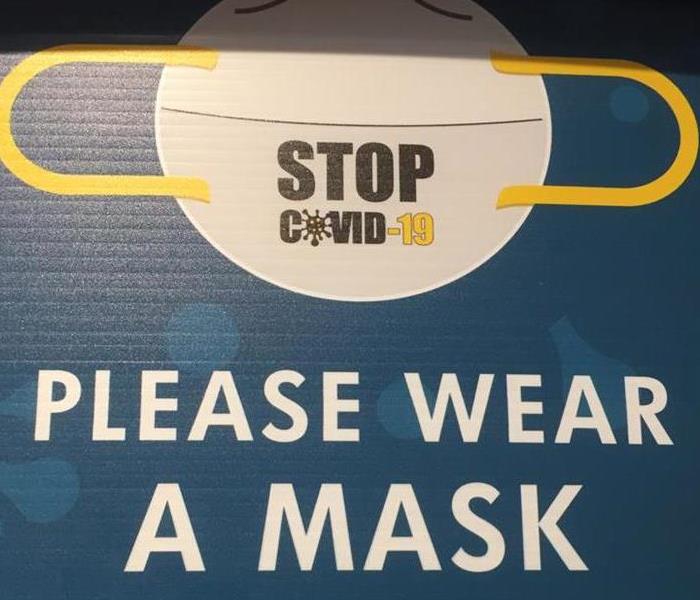 COVID-19 Pandemic Please Wear a Mask
COVID-19 Pandemic Please Wear a Mask
Entering year one of the Coronavirus (COVID-19) pandemic we have all heard varying thoughts and procedures to keep a person safe. But here at SERVPRO® of Mayes and Wagner Counites, we would like to have a little reminder course on some safe practices.
Personal hygiene is especially important at this time, here are a few tips to follow.
- Wear a mask in public settings that covers both your nose and mouth.
- Masks should not be placed on young children under age 2, anyone who has trouble breathing, or is unconscious, incapacitated or otherwise unable to remove the mask without assistance.
- Do NOT use a mask meant for a healthcare worker. Currently, surgical masks and N95 respirators are critical supplies that should be reserved for healthcare workers and other first responders.
- Frequently wash your hands with soap and water for at least 20 seconds.
- Wash your hands after you have sneezed or coughed in your hands.
- Wash your hands after you have been out in public.
- Wash your hands before you eat or drink anything.
- Wash your hands after you have used the restrooms.
- When soap and running water are unavailable, use an alcohol-based sanitizer with at least 60% alcohol.
- Avoid poorly ventilated areas.
- Avoid indoor spaces that do not offer fresh air from the outdoors as much as possible. If indoors, bring in fresh air by opening windows and doors, if possible.
- Avoid large crowds or gatherings.
- Avoid indoor spaces that do not offer fresh air from the outdoors as much as possible. If indoors, bring in fresh air by opening windows and doors, if possible.
- Avoid touching your eyes, nose, or mouth with unwashed hands.
- Cover your cough or sneeze with a tissue, then throw the tissue in the trash.
- If a tissue is unavailable, use the bend of your elbow to catch your cough or sneeze.
- Clean and disinfect frequently touched objects and surfaces using a regular household cleaning spray or wipe.
- Remote controls, cell phones, keys, light switches, and door handles are a few examples of objects that should be cleaned as frequently as possible.
- Stay home when you are not feeling well to prevent the risk of spreading illness to others.
- Common symptoms include but are not limited to – shortness of breath, loss of taste, loss of smell, high fever, aches and pains, headaches.
- Maintain a proper social distance between people, about six feet or two arm’s length apart.
- Maintaining a safer than normal distance around those who are more susceptible to catching the virus is recommended.
- Shaking hands and other forms of social greeting that creates contact with other people is discouraged during this period.
- Try bumping elbows or just a friendly waive during the pandemic.
Our team hopes that these tips were helpful and that everyone will stay safe in such a crisis and take the proper precautions to remain healthy.
If you have any questions, call your SERVPRO® of Mayes and Wagoner Counites, 918-486-1055. 24/7 Emergency Response.
12 Tips for the New Year
1/4/2021 (Permalink)
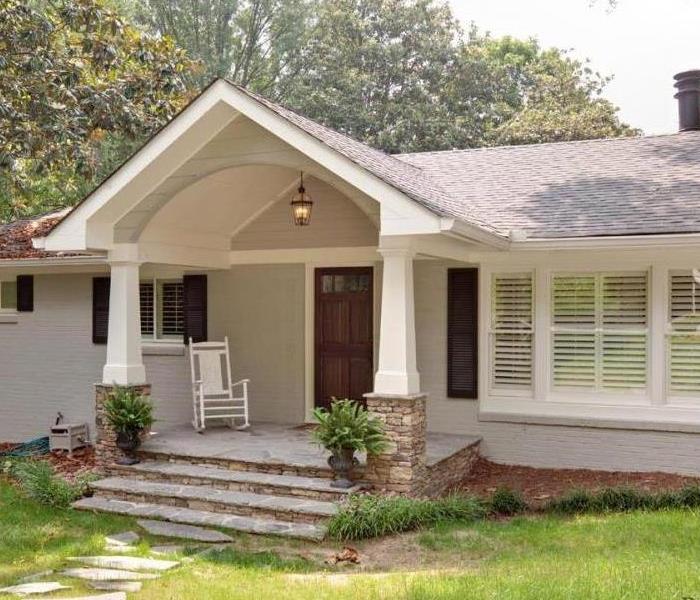 Take time to do some inspections of your home.
Take time to do some inspections of your home.
Welcome to 2021.
2020 was one for the books but we at SERVPRO® of Mayes and Wagoner Counties are excited for what the new year brings.
We are entering our second year as the newest SERVPRO® franchise in the area and thrilled to be serving eastern Oklahoma.
With the new year we want to offer a few tips to it kick off.
12 Tips for the New Year
- Do a general safety check around your home. Check your smoke detector and carbon monoxide detector and make sure they are in good working order. Make sure you have an updated fire extinguisher in your kitchen and one on the other end of the house too.
- Go over a fire / emergency evacuation plan with your family. Identify all the exits, including windows that can be used to escape if needed. Also have a plan of where to meet if you must evacuate the house.
- Locate your shut offs for your home. Locate your water, gas and main power shut off. If you are unsure of there location, contact your service provider. For business, SERVPRO® offers a free ERP (Emergency Response Plan). Ask us about it.
- Check for leaks around the house. With the colder weather, weak points in your plumbing will present themselves. Take some time to inspect around sinks, toilets, and showers for leaks.
- Make sure your windows and doors are properly sealed. Cracks around doors and windows can allow heat to escape, causing higher heating bills.
- Look for limbs on the roof and clogged up gutters, which can cause water intrusion under your roof.
- As spring and warmer temperatures arrive, do a quick self-service on your A/C unit. First disconnect your unit from the power. Rake away any leaves or debris from around your outside unit. If you are mechanically inclined, remove the outside shell and clean out the inside of the unit. Using a degreaser cleaner and water hose will do wonders.
- If you have a deck. Check your deck for protruding nails or screws. Check for any loose or rotten boards, replace or repair as needed. A new coat of paint or stain will help protect your deck throughout the summer.
- Check for insect activity and take a few minutes and look for any signs of termite or carpenter ant damage. Over the counter pest control sprays are a great way to keep unwanted insects from invading your home but you can always contact a professional pest company to assist you with this.
- Give your roof a once over. Your roof is subject to wear and tear. Check the areas around the eaves and gutters for leaks and water damage. Many times, a roof leak can lead to larger issues, including mold, elsewhere in your home. You should also be sure to check for any loose or missing shingles and replace these, as necessary. This will help prevent further damage from storms or extreme weather.
- Inspect the exterior of your home. Look for chipped or peeling paint and cracks in your siding. If needed, add some new caulk to repair damage. This is also a good time to look for signs of foundation damage, such as cracks in the foundation or gaps between bricks.
- If you have a fire place, give it a thorough inspection. You can schedule a professional fireplace inspection and chimney cleaning to ensure everything is in proper working order. Other fireplace maintenance tips include removing ashes, making sure the flue damper opens and closes easily, and removing unsightly smoke and soot stains.
SERVPRO® of Mayes and Wagoner Counties specializes in Fire and Water Cleanup and Restoration.
If you have any questions, call your SERVPRO® of Mayes and Wagoner Counites, 918-486-1055. 24/7 Emergency Response. And always FREE Estimates for any job.
Christmas Tree Fire Safety
12/11/2020 (Permalink)
 Don't let your Christmas Tree ruin your holidays.
Don't let your Christmas Tree ruin your holidays.
Tis the season for Christmas trees, decorating and the most home fires of any other time of the year. Christmas trees alone result in 13 million dollars a year in property damage.
With the holiday season celebrations, many Christmas trees, decorations, and ribbons are highly flammable. Here are a few tips from the National Fire Protection Association (NFPA) to keep your family safe and reduce the risk of house fires.
Make sure the Christmas tree is at least three feet away from any heat source (fireplace, radiator, candles, heat vents, or lights).
Make sure the tree is not blocking an exit.
If you have a live tree, add water to your tree daily to keep your tree from drying out.
Replace any string of lights with worn or broken cords or loose bulb connections. Never use lit candles to light up the tree.
Always turn off the lights on the tree before going to bed or leaving.
If you purchase an artificial tree, look for the fire-resistant brands.
Do not let your Holliday season burn out and go up in flames. Remember these few safety tips to help make sure your Holliday season goes as planned and if you have any questions, call your SERVPRO of Mayes and Wagoner Counites, 918-486-1055.
SERVPRO: For All of Your Restoration Needs!
5/5/2020 (Permalink)
SERVPRO of Mayes & Wagoner Counties should always be your primary choice for any of your restoration services; from water and fire restoration, to mold mitigation, to duct cleaning — you name it — we do it all!
Not only that, but we are available 24/7 for any and all of your needs. We are there when you need us, especially during odd hours and times when you would need us most.
There is no flood too small, and no fire loss too large for us to handle; we tackle each job with a steadfast commitment to complete our goals on time, professionally, and with the utmost care.
Don't believe us? Check out our Google and Facebook reviews — we take great pride in being able to provide quality service to our residents.
If you ever need a restoration company you can count on, you know who to call...
SERVPRO of Mayes & Wagoner Counties!
Space Heater Safety
12/9/2019 (Permalink)
With the cost and hassle of replacing central heat, a lot of people are using more space heaters. These heaters can lower your energy bills by adding direct warmth to the rooms you use more frequently. But while these portable heaters can be both efficient and economical, there are a few things you need to keep in mind when putting one in your home.
When shopping for a space heater make sure to buy one that fits your needs. Buying a larger heater for a smaller area can cause your utility bills to be higher. A small heater being used to cover a larger area will cause it to work harder. Make sure to buy a heater with overheat protection.
Room heaters with overheat protection switches function by using a temperature sensor to detect when internal components become too hot. When an unsafe temperature is detected, the switch automatically shuts off the unit to prevent overheating. Most new space heater also offer tip over protection. This feature shuts the space heater off if it accidentally tips over. Another great feature is the cool-touch feature where the exterior part of the heater is safe to touch for houses with children or pets.
One good rule is to always plug a space heater directly into an outlet. Plugging directly into an outlet helps prevent over heating. Plugging into an extension cord can cause fires, overheating, or a chance of electrical shock. Remember that if you do have to plug into an extension cord use one that is rated for the size of the space heater.
Stay away from using space heaters in humid areas and bathrooms. To avoid shock do not touch a space heater with wet hands or any type of water. Remember to always shut off your heater when leaving the area. Some heaters have automatic timers that shut off for you, but leaving a heater on and unsupervised can be very costly and dangerous.
Educating yourself about the safety hazards that come with the improper use of portable heaters will help you achieve better peace of mind as you keep your home warm, comfortable, and fire hazard-free this winter.
Christmas Tree Fire Safety
12/8/2019 (Permalink)
Don’t let Christmas ever heat up too much — with fire that is. Christmas trees alone result in 13 million dollars a year in property damage. More importantly, these fires can be dangerous to your family and friends. Tree dryness, electrical malfunctions, and poor location can be a deadly combination when showcasing a live tree in your home.
Here are some safety tips for your tree to help unwanted surprises during the Hollidays.
-Keep the bases of the tree well watered to prevent it from drying out.
-Keep away from heat sources such as heaters, fireplaces, or light sources such as candles.
-Fresh trees are less likely to catch fire, so look for a tree with vibrant green needles that are hard to pluck and don’t break easily from its branches.
-Do not forget to turn the Christmas lights on the tree out at night.
-Be sure to plug your lights into a ground-fault circuit interrupter protected receptacle.
Don’t let your Holliday season burn out and go up in flames. Remember these few safety tips to help make sure your Holliday season goes as planned.






 24/7 Emergency Service
24/7 Emergency Service







